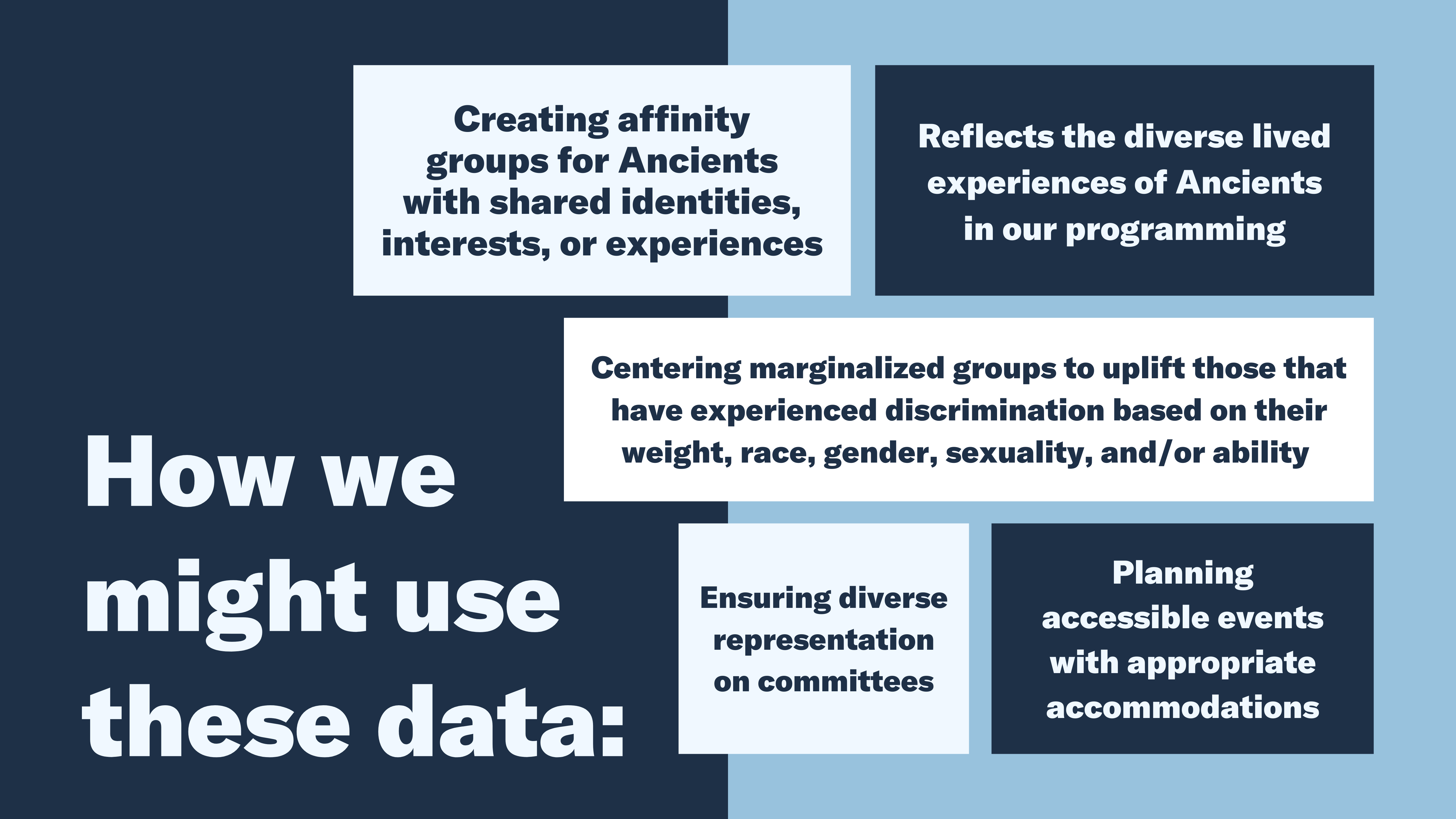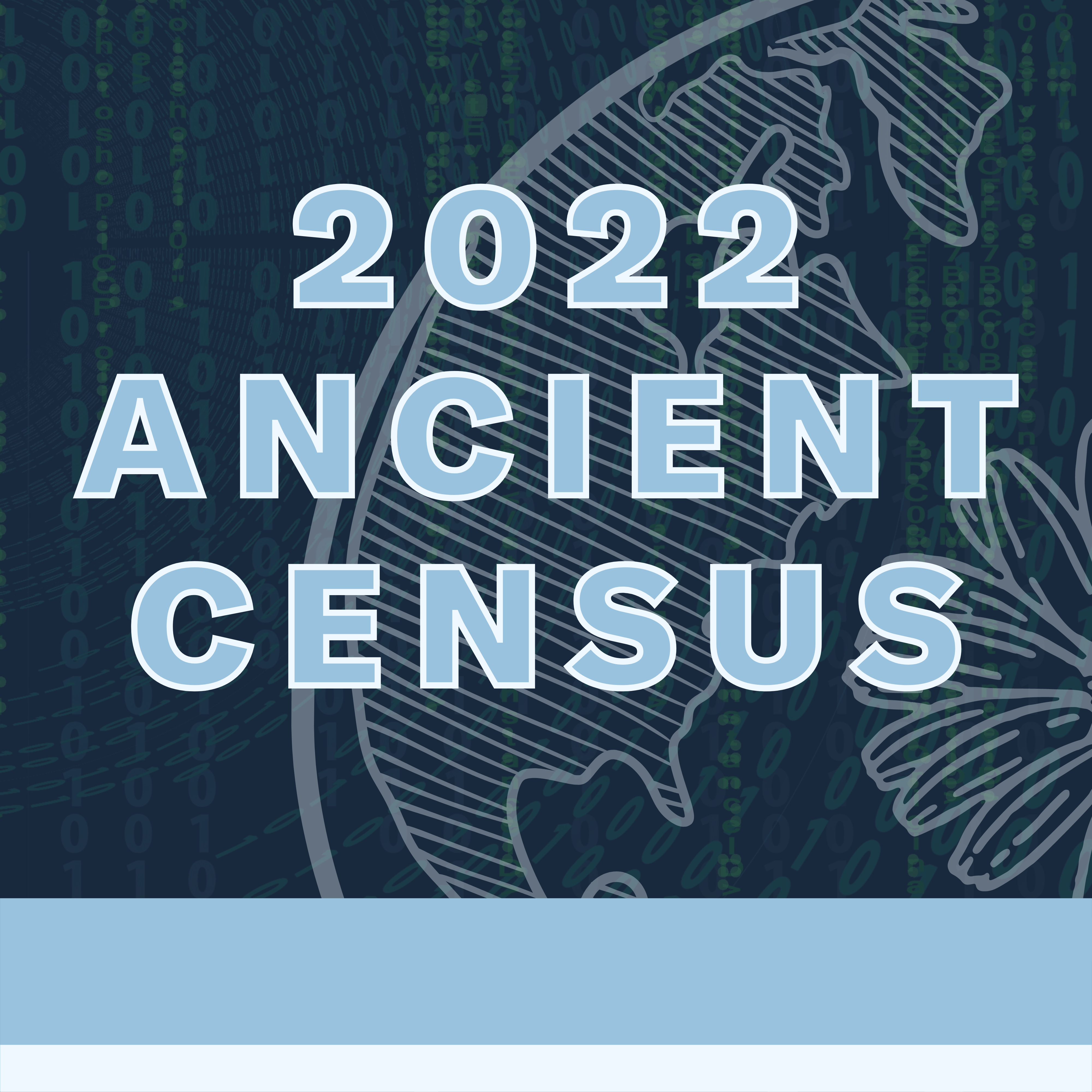Help us know, understand, and represent our Ancient population more accurately!

This census is the second survey in a series designed to help us know, understand, and represent our Ancient population more accurately. In order to respect the identity of our graduates, we need to have access to current information. By asking identity questions, we can avoid making harmful or inaccurate assumptions about our Ancients.
This census will address all of the “Big 8” socially constructed identities: race, ethnicity, sexual orientation, gender identity, ability, religion/spirituality, nationality, and socioeconomic status. As a school, Miss Porter’s is deeply committed to the work of Diversity, Equity, Inclusion, and Belonging and in order to extend this commitment to our Ancient population, we feel it is necessary to give every graduate the opportunity to tell us who they are right now and how they would like to be seen.
When sharing reports out from the census, we will represent the data in aggregate to gauge trends, identify general needs, and identify underrepresented populations. These data in the aggregate will be analyzed against other factors, including event attendance, donor participation, and other engagement, to critically assess whether MPS’s outreach has been inclusive and whether it is engaging a diverse audience.
We will also utilize the data on an individual basis to reach out to and represent Ancients that identify in a specific way. For instance, if we need the perspective of a Middle Eastern Ancient for a panel, we might reach out to someone that shared on the census that they identify as Middle Eastern and has agreed to additional outreach of this nature. We will assess the composition of committees on their diversity. We will never distribute or share this information publicly without communicating with the individual first.
We will use these data to better understand and serve our Ancient population. We hope to have the chance to implement our findings to make future events, such as All-School Reunion, more welcoming.
Here are some examples of how we might use these data:
- When mailing a letter – displaying someone’s name in the correct way on the envelope and in the text of the letter; i.e., with or without a maiden name, with or without an honorific, using the appropriate honorific, using a nickname, etc.
- Displaying pronouns on a nametag.
- Creating affinity groups for those with a shared identity and inviting Ancients that identify in that way; i.e., Ancients of Color, LGBTQ+ Ancients, Jewish Ancients, Ancients in Law, etc.
- Creating a wide range of dietary options at on- and off-campus events that meets the needs of attendees.
- To center marginalized groups in an ongoing effort to uplift those that have experienced discrimination based on their weight, race, gender, sexuality, and/or ability.
- To identify ways in which all events should be modified to expand equitable access and provide appropriate accommodations for all Ancients.
- To develop programming that reflects the diverse, lived experiences of our Ancients.
Members of the Miss Porter’s School Alumnae and Development Office and Information Technology Department will have access to these data. Upon being hired, all employees with access to sensitive information sign a Confidentiality Agreement, which states that they may not disclose, divulge, or make accessible confidential individual information obtained through their work at the school. Employees with access to the data will have training on its ethical usage.
Certain volunteers will have limited access to alumnae contact information. These volunteers are required to sign a volunteer confidentiality agreement. Volunteers will not have access to demographic identity information.
The information is stored in a secure database that can only be accessed by Miss Porter’s School Alumnae and Development Office and Information Technology Department. Personal data are stored in line with the school’s document retention policy and in accordance with the applicable laws, including Connecticut General Statutes and Public Acts and the EU’s General Data Protection Regulation (GDPR). Miss Porter’s School does not store personal data indefinitely, and data are only stored for as long as is necessary to complete the task for which it was originally collected. Learn more about our privacy policy at this link: https://www.porters.org/privacy-policy/
The primary platform that Miss Porter’s School utilizes to store your personal information, Blackbaud, takes data security/integrity very seriously. Following a ransomware attack in 2020, Blackbaud identified and eliminated the associated vulnerability that was at issue in the incident; and hired its own cybersecurity team to continue monitoring for this type of criminal activity.
Blackbaud’s Information Security team leverages the industry standard CIA Triad Model (Confidentiality, Integrity, Availability) in conjunction with various industry control frameworks, such as the NIST CSF, PCI DSS, ISO27001, SOC 1, SOC 1 type 2, and others as protection.
Blackbaud also has dedicated legal counsel who continually evaluate upcoming and changing regulations as they relate to data privacy to ensure we are aligned to these regulations, as well as providing thought leadership for their customers on the operational impact of these regulations and compliance requirements. To learn more about Blackbaud’s security practices, please visit https://www.blackbaud.com/security.
In considering which categories of identity data to collect, our primary motivation was to a) collect data for which we have specific, pertinent, and actionable plans to use to inform our work in inclusivity and accessibility, and b) to collect data on identities that often experience discrimination and marginalization. We followed recommended practices for inclusive data collection methods and used terminology provided by advocacy organizations. We viewed race as a social and cultural construct, informed by the following resource: https://www.britannica.com/topic/race-human
Throughout the survey, you’ll note that most response options are listed alphabetically. This was an intentional choice to avoid inadvertently implying a “hierarchy of identities”. The wording of the questions, as well as the response options we present, was designed to promote inclusion and equity within our community and avoid perpetuating harmful stereotypes. While we were conscientious in selecting response options that are inclusive, in categories such as ethnicity and religion, it wasn’t feasible to provide an all-encompassing list. Thus, we listed high-level categories with an option for respondents to provide further detail. The options were derived from data collection methodologies used by a number of research organizations, including the Pew Research Center, the Public Religion Research Institute, and the UCLA Williams Institute, as well as from recommended practices from equity advocacy organizations.
We opted to include a question related to weight-based discrimination and stigma to recognize that people with larger body sizes face routine and systemic forms of oppression. While we recognize that this is an uncommon question and that weight-based stigma is so pervasive that it is an uncomfortable topic to address, our inclusivity framework includes those who experience this form of marginalization.
Miss Porter’s School partnered with The Inclusion Firm, a national consulting practice that focuses on developing inclusive strategies for organizational change, to develop the census. Our process was informed by the Apra Ethics & Compliance Committee Diversity, Equity, and Inclusion Data Guide and the Charles and Lynn Schusterman Family Philanthropies DEI Data Collection Guide.
Throughout the survey, you will always have the option to select “Prefer not to Respond.” For questions in which categories are listed, you will also have the option to self-describe your identity if none of the categories fit. Our hope is for each Ancient to feel “seen.”
Yes, Miss Porter’s School will provide additional future opportunities to update your responses to the questions. You can also contact Miss Porter’s School Alumnae and Development Office at any time to update your responses.
Miss Porter’s School acknowledges that oppression and discrimination related to identity are persistent and pervasive. While civil-rights reforms have helped advance equity and reduce legal forms of discrimination, discrimination still persists, operating through a combination of social, economic, and institutional practices. We believe that by refusing to acknowledge racial, ethnic, gender, sexuality, and other difference (a practice sometimes referred to as being “colorblind”), we are often turning a blind eye to the very real ways in which discrimination and systemic oppression continue to harm our communities.
As a girls’ school, identity has always been part of the Miss Porter’s School experience. We want to expand our understanding of the identity of our Ancients to go beyond gender to be intersectional.


